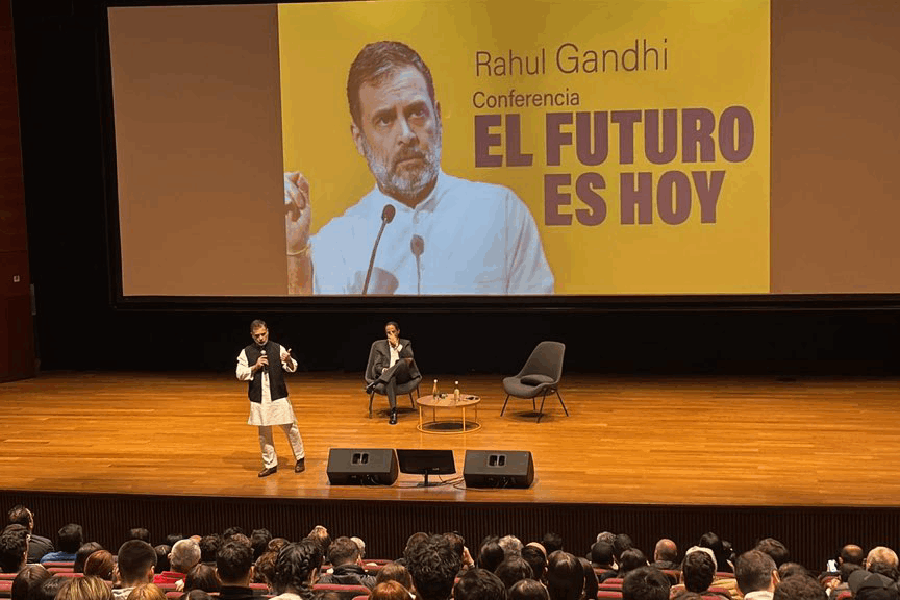The Leader of Opposition in the Lok Sabha, Rahul Gandhi, seems to have perfected one skill in politics: converting every foreign visit into a grievance roadshow against his own country. If the role of LoP is to uphold democratic debate within the sacred precincts of Parliament, Rahul has chosen instead to become a permanent India-basher abroad, regurgitating clichés like “Constitution in danger,” “vote chori,” and “institutions captured.”
The irony? India today is surging ahead as the fastest-growing large economy, a military and nuclear powerhouse, and a leader in technological innovation—from Chandrayaan to Fintech. Yet, its Opposition leader insists on depicting the nation as a dictatorship on life support.
At Cambridge University in March 2023, Rahul declared:
“Indian democracy is under pressure and under attack. The institutional framework which is required for democracy … the Parliament, free press, the judiciary, just the idea of mobilisation … these are all getting constrained. We are facing an attack on the basic structure of democracy.”
He even claimed, without evidence:
“I myself had Pegasus on my phone. A large number of politicians had Pegasus on their phones. I was told to be careful when I speak on the phone.”
And then the pièce de résistance:
“In my view, Narendra Modi is destroying the architecture of India … To impose one idea on a union of states will make it react.”
Such melodrama plays well in Cambridge seminar halls, but back home it rings hollow.
In June 2023, Rahul Gandhi carried the circus to Georgetown University in Washington DC:
“I don’t see it as a fair election. I see it as a heavily controlled election.”
He alleged that the BJP had “a huge financial advantage” and that “the Election Commission was doing what they wanted.”
At a diaspora meet in Boston this April, he doubled down:
“More people voted in the Maharashtra Assembly elections than there are adults in the state … Between 5.30 pm and 7.30 pm, 65 lakh voters cast their votes. Now, that is physically impossible to happen.”

And the final flourish:
“It’s very clear to us that the Election Commission is compromised. There is something very wrong with the system. I have said this multiple times.”
For the Leader of Opposition to stand on American soil and allege that India’s elections—the largest democratic exercise in human history—are fraudulent is not just childish, it is treacherous.
The script hardly changes. On October 2, 2025, at EIA University in Colombia, Rahul once again claimed a “wholesale attack on Indian democracy.” Predictably, BJP leaders slammed him for defaming India abroad yet again.
It is difficult to ignore the baggage Rahul Gandhi carries. The dynasty he represents has been tainted by scams from Bofors to 2G, from Coalgate to AgustaWestland. He and his family are still entangled in the National Herald case, facing money-laundering investigations. Questions about his nationality also persist, with UK company documents surfacing in the past listing him as a “British citizen.”
For someone unable to hold on to Amethi, his family bastion, and forced to flee to Wayanad for political survival, the habit of sermonizing to foreign audiences is less a show of statesmanship than of desperation.
Democracy needs a strong Opposition. India deserves one. But when the LoP chooses foreign think tanks, universities, and diaspora meets as platforms to allege that India’s elections are rigged, its institutions compromised, and its Constitution under attack, the Opposition ceases to be credible. It becomes a punchline.
Rahul Gandhi may find claps in Cambridge or Washington, but in India, his conduct earns ridicule. The real tragedy is not that India’s Constitution is in danger—it is that the Opposition has abdicated responsibility at home to play court jester abroad.
India’s democracy has survived wars, the Emergency, terrorism, and political instability. It will survive Rahul Gandhi’s whining too. The institutions he maligns are strong. The people he insults are wiser than he gives them credit for.
What is in danger is not India, but the relevance of an Opposition that behaves like a sulking schoolboy, running to foreign capitals for validation.






